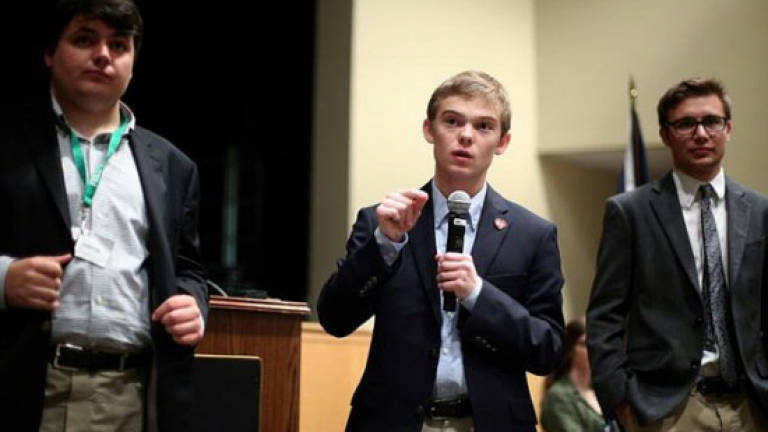Teen governor? Kansas youths take on adults in a heartland US state

WITH loose khaki pants, a button-down shirt and a dark blue blazer, Tyler Ruzich looks a lot like any number of aspiring politicians before him.
But if the election Ruzich is running in were to be held today, he'd be too young to vote for himself.
The 17-year-old is one of five teens throwing their hats in the crowded ring for next year's governor's race in Kansas, which has permissive rules about who can run for the state's top elected post.
Speaking recently to a crowd of students at a high school gym in the city of Lawrence, Ruzich picked up a microphone and launched into his campaign speech.
"It's pretty clear that our politicians have neglected us," Ruzich said, competing to be heard over the clangs of a nearby weightlifting room.
Next to him were three other teen gubernatorial candidates.
In this geographical center of the continental United States – affectionately called America's Heartland – the teenagers vying for the governor's office are injecting youthful ambition into the 2018 election cycle.
Emboldened by the Trump era, where anything seems possible in American politics, the teens are challenging the status quo in a deeply Republican state.
"I view this as really an important opportunity to get younger people involved," Ruzich, a Republican, told AFP.
The teenage candidates are taking advantage of the fact that Kansas has no age restrictions on who can run for governor – one candidate even jokingly suggested that a dog could get on the ballot.
The only other state with such permissive election laws, sparsely populated Vermont, in the northeast, has a 13-year-old gubernatorial candidate.
People are 'fed up'
Jack Bergeson, 16, was the first Kansas teen to file election papers in the spring of 2016. The novelty of it landed him on a national late-night talk show and drew the attention of news media.
By this summer, 17-year-olds Ruzich and Ethan Randleas had joined the race; Dominic Scavuzzo announced his candidacy in the fall. And last week, 16-year-old Joseph Tutera Jr. became the latest teen to seek the state's highest office.
"It's an overall good thing. People are showing that the younger generation is here to make an impact," Bergeson told AFP.
The young men – no girls have joined in – are hoping to tap into the anti-establishment fervor coursing through American politics and roiling the Republican Party.
Incumbents are facing unexpected challenges in next year's midterm elections from outsiders emboldened by Donald Trump's rhetoric and his surprise presidential victory.
"I'm not necessarily a supporter of the president, but he has showed that people are fed up with the establishment," Bergeson said.
The teens hope to inspire younger people to register to vote.
Of the five, only Bergeson is a Democrat. The other four are Republicans in a state Trump won by more than 20 points.
And like Trump, the five are willing to buck their respective parties.
Ruzich would raise business taxes – anathema to true-believer Republicans. Bergeson would raise taxes, too. And, all five teens would legalize marijuana.
Uncertain race
The young candidates' participation in the gubernatorial race has been a spectacle, but it could have real impact.
Students at the high school campaign event said they were inspired.
"It was really cool to see someone closer to my age actually up there talking about these political issues," 17-year-old Josh Morris said.
More significantly, the teens' presence on the ballot could affect adult candidates, said Burdett Loomis, professor of political science at the University of Kansas.
"It's a hugely open and uncertain race," Loomis said, adding that the teens could drain votes from older candidates.
The adults might just want to pay attention; there is precedent for teens winning elected office in the US.
Saira Blair, aged 17 when she ran in 2014 for a seat in the West Virginia state legislature, became the youngest person ever elected to state or federal office, defeating an incumbent in her own Republican Party.
The Kansas teens' candidacies led one adult gubernatorial contender to suggest changing the law.
"I think it's both amusing and encouraging that high school students are throwing their name into the governor's race," Kris Kobach told the Kansas City Star newspaper in Sept.
"But it is appropriate to have minimum ages for the governor's office," said Kobach, who as Kansas secretary of state is in charge of administering elections – and who also is heading Trump's controversial commission investigating alleged voter fraud.
Many of the teen candidates acknowledge their age is a barrier.
"People don't think I'm quite experienced," Scavuzzo told AFP, "but to win this election isn't necessarily winning the governorship."
Getting young people more involved in politics, he added, would be a victory in itself. — AFP